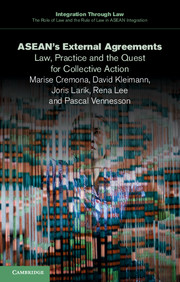Book contents
- Frontmatter
- Contents
- List of tables
- List of charts
- General editors' preface
- 1 Introduction
- 2 The legal and institutional framework for ASEAN external agreements: the centrality of ASEAN
- 3 An inventory and typology of ASEAN external instruments: overview and trends
- 4 ASEAN as a contracting party
- 5 Beyond market access? The anatomy of ASEAN's preferential trade agreements
- 6 A regional strategy: a typology of ASEAN partnership and co-operation agreements
- 7 Between great-power rivalries and supranationality: ASEAN external instruments and regional hedging strategies
- Executive summary
- Appendices
- Index
6 - A regional strategy: a typology of ASEAN partnership and co-operation agreements
Published online by Cambridge University Press: 05 May 2015
- Frontmatter
- Contents
- List of tables
- List of charts
- General editors' preface
- 1 Introduction
- 2 The legal and institutional framework for ASEAN external agreements: the centrality of ASEAN
- 3 An inventory and typology of ASEAN external instruments: overview and trends
- 4 ASEAN as a contracting party
- 5 Beyond market access? The anatomy of ASEAN's preferential trade agreements
- 6 A regional strategy: a typology of ASEAN partnership and co-operation agreements
- 7 Between great-power rivalries and supranationality: ASEAN external instruments and regional hedging strategies
- Executive summary
- Appendices
- Index
Summary
Introduction
In this chapter we turn to the substantive category of ASEAN agreements that does not derive directly from one of the three pillars of ASEAN: ‘partnership and co-operation’ agreements. To some extent, this is a residual category as it covers agreements that do not fit easily into the other three categories, or that cover more than one of the ASEAN pillars. Nevertheless, this does not lessen their importance in assessing ASEAN as an international actor. In fact, some of the key features of ASEAN's external relations become evident here. The chapter will start with a general overview of ASEAN's partnership and co-operation agreements, followed by the three hallmarks of ASEAN's external-relations practice which they reveal. These are, first, the role of ASEAN as a regional architect; second, the externalisation of the ‘ASEAN Way’ by relying heavily on ‘soft’ legal instruments; and third, the existence and use of an ASEAN legal personality in ASEAN's relations with other international organisations.
Overview of the category
The concepts of co-operation and partnership are at the heart of the Charter's vision of ASEAN's external relations. Article 41(1) of the Charter gives ASEAN a mandate to ‘develop friendly relations and mutually beneficial dialogue, cooperation and partnerships with countries and sub-regional, regional and international organisations and institutions’. Article 44 of the Charter also institutionalised the pre-existing ASEAN practice of granting different types of partnership status to third countries, including dialogue partner and sectoral dialogue partner. In terms of absolute numbers, partnership and co-operation instruments represent the second-largest substantive category after economic instruments. There are more than twice as many ASEAN partnership and co-operation instruments (sixty-one) than political-security and socio-cultural instruments combined. These instruments are especially important as a basis for relations with ASEAN's dialogue partners and in particular with its six key partners (China, the EU, Korea, the USA, Australia and Japan). With regard to the USA, Australia and Japan, partnership and co-operation instruments approximately equal economic instruments in number.
- Type
- Chapter
- Information
- ASEAN's External AgreementsLaw, Practice and the Quest for Collective Action, pp. 236 - 256Publisher: Cambridge University PressPrint publication year: 2015



